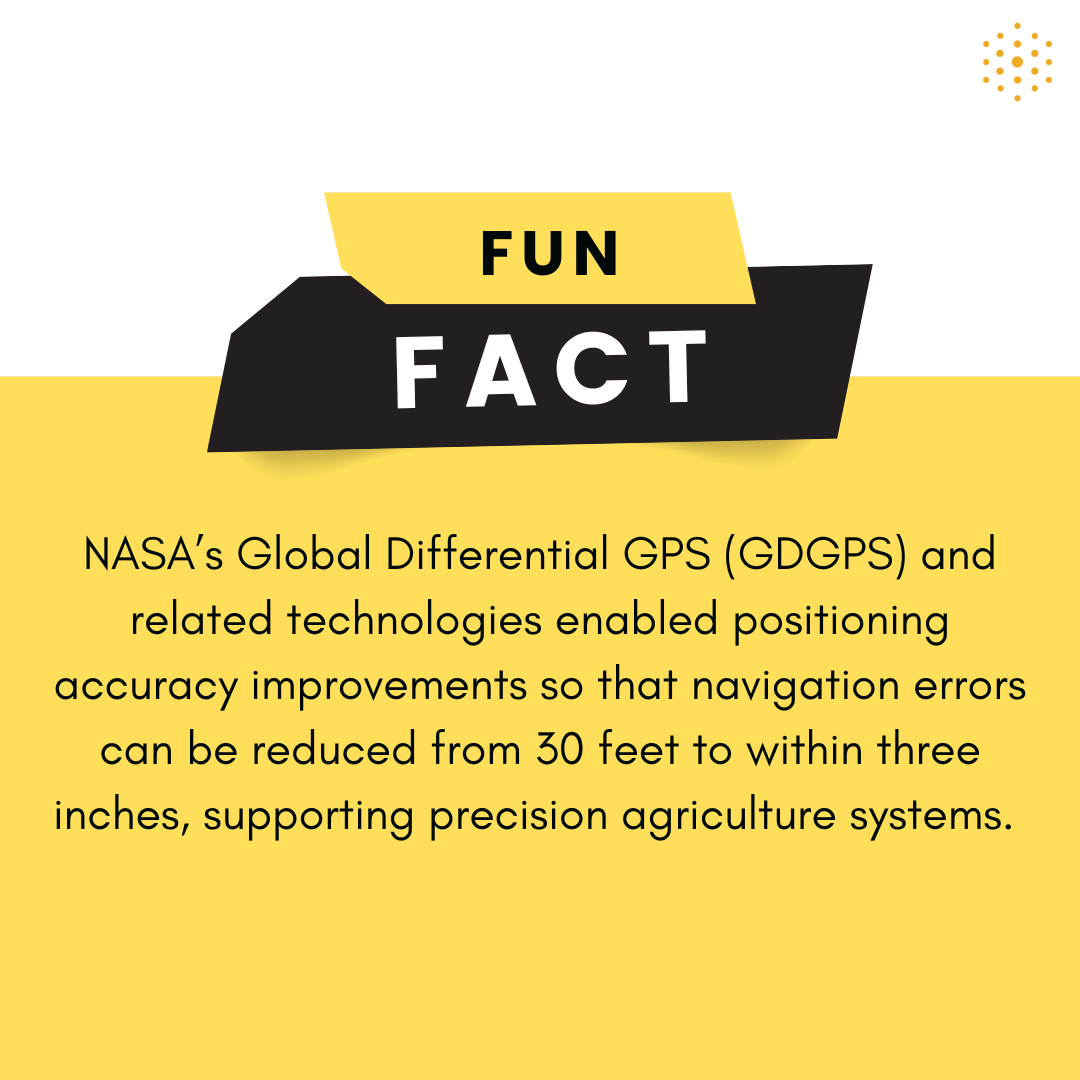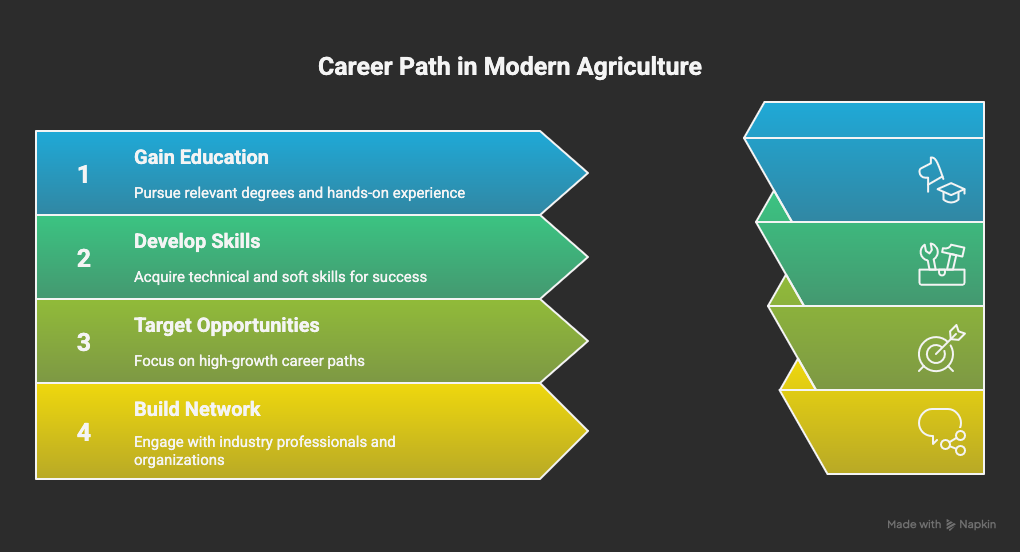How can you build a successful modern agriculture career?
Explore specialized sectors like AgriTech, food science, and sustainable farming. Gain a strong educational foundation, pursue certifications in precision agriculture or GIS, and build a hybrid skill set that blends technology, business, and environmental expertise to thrive in this evolving, high-impact industry.
When you think of a career in agriculture, what comes to mind? If it's just a farmer on a tractor, it's time for an update.
Today's agriculture is a powerhouse of innovation, a massive, science-driven industry tackling the world's most critical challenges, from global food security to climate change.
In the U.S. alone, they contributed a staggering $1.537 trillion to the nation's GDP in 2023, according to the U.S. Department of Agriculture (USDA).
Globally, the agricultural sector employed 916 million people in 2023, making up over a quarter of total global employment, according to the Food and Agriculture Organization of the United Nations (FAO).
If you're looking for a career with purpose, stability, and immense growth potential, you've found it. This guide provides 5 actionable steps to launch your career in this essential and exciting industry.
Step 1: Find Your Fit in the New Agricultural Landscape
First things first: forget the one-size-fits-all approach.
The modern agriculture industry is a vast ecosystem of specialized fields.
Your perfect career will be at the intersection of your passions and the industry's most pressing needs.
Start by exploring these key sectors:
- AgriTech (Agricultural Technology): This is the heart of modern farming innovation. It’s where data scientists, engineers, and software developers create tools that are changing the face of agriculture. We're talking about AI-powered systems that can predict crop yields, robotic weeders that reduce the need for herbicides, and drones that monitor crop health from the sky. If you are tech-savvy, this is your playground. A key role here is a Precision Agriculture Specialist, who helps farmers use technology to maximize yields and minimize waste.
- Agribusiness: This is the commercial engine of the industry. It covers the entire spectrum of business operations, from finance and marketing to logistics and international trade. If you have a business mindset, you could thrive as an Agricultural Economist, analyzing market trends to guide business strategy. These roles are highly valued, with salaries often ranging from $80,000 to $130,000 annually, according to AgHires.
- Food Science and Innovation: Are you a scientist at heart? This sector is dedicated to the research and development that improves food safety, enhances nutrition, and creates new food products. You could be a Food Scientist working on plant-based proteins or an Animal Geneticist studying how to breed healthier, more resilient livestock.
- Sustainable and Regenerative Agriculture: With growing concerns about climate change, this field is exploding. It’s focused on farming practices that restore soil health, enhance biodiversity, and capture carbon. Professionals in this area work as consultants, researchers, and farm managers who are pioneering a more environmentally friendly way to feed the world.
Step 2: Get the Right Education and Training
Once you've identified a sector that excites you, it's time to get the right qualifications. While on-the-job training is valuable, the most specialized and high-paying roles increasingly require a solid educational foundation.
- Relevant Degrees: A Bachelor of Science in fields like Agricultural Science, Agricultural Engineering, Food Science, or Environmental Science is a strong starting point. Many universities now offer cutting-edge specializations in areas like agricultural data analytics and sustainable food systems.
- Hands-On Experience: Nothing beats real-world experience. Aggressively pursue internships and co-op programs. This is your chance to apply classroom knowledge, build your network, and demonstrate your value to potential employers. This experience is what will make your resume shine.
- Certifications: In the tech-heavy landscape of AgriTech, certifications can make you a more competitive candidate. Credentials like becoming a Certified Crop Adviser (CCA) or getting certified in specific GIS or drone technologies can open doors to specialized roles.

Step 3: Develop the High-Demand Skills Employers Want
The ideal agricultural professional today is a hybrid: part scientist, part tech guru, and part business strategist. To succeed, you need to cultivate a diverse skill set.
- Hard Skills: Technical proficiency is non-negotiable. Employers are looking for candidates skilled in data analysis, GIS mapping software, and the operation of drones and IoT sensors. A deep understanding of soil science, plant biology, and modern crop management techniques remains fundamental.
- Soft Skills: Technical skills get you in the door, but soft skills help you climb the ladder. Agriculture is an industry of problem-solving, requiring you to adapt to unpredictable variables like weather and market shifts. You'll need excellent communication skills to collaborate with diverse teams of farmers, engineers, and executives. Showcasing these transferable skills is crucial, especially if you're making a career change.
Step 4: Target High-Growth Career Opportunities
With the right training and skills, you are primed to step into some of the most dynamic and well-compensated roles in the industry.
The demand for professionals who can bridge the gap between technology and traditional farming is soaring.
Consider these lucrative and in-demand career paths:
- Precision Agriculture Specialist: This role is central to the farm of the future. The average salary in the U.S. is approximately $63,004, with top earners reaching nearly $100,000, according to ZipRecruiter.
- Agricultural Engineer: Tasked with designing the next generation of farming machinery and sustainable infrastructure, these engineers command high salaries, typically between $75,000 and $120,000 per year, as reported by AgHires.
- Farm Manager: The role of a farm manager has evolved into a high-stakes executive position. Overseeing large-scale operations, these professionals can earn between $70,000 and $120,000 annually.
While overall employment for traditional agricultural workers is projected to decline slightly, the U.S. Bureau of Labor Statistics projects about 116,200 openings for agricultural workers each year on average over the next decade, largely due to the need to replace workers who transfer to different occupations or exit the labor force.
The growth is in the specialized, high-skill roles.
Step 5: Build Your Network and Launch Your Career
Finally, immerse yourself in the agricultural community. Building a strong professional network is your final step to launching a successful career.
- Join Professional Organizations: Become a member of groups like the American Society of Agronomy or the National Agri-Marketing Association. These organizations offer invaluable resources, from job boards to networking events and industry publications.
- Attend Industry Events: Make it a point to attend conferences and trade shows. These are the best places to see the latest technology firsthand, learn from industry leaders, and connect with hiring managers.
- Craft Your Professional Brand: Your professional narrative starts online. Create a compelling LinkedIn profile that highlights your skills and passion for the industry. When you're ready to apply for jobs, tailor your resume and write a powerful cover letter that tells your story and clearly articulates your value proposition.

Final Thoughts
Agriculture is no longer a traditional field, it’s a fast-evolving industry blending technology, science, and sustainability.
By exploring the right sector, gaining skills, and building connections, you can carve out a future-proof career that makes a real impact.
At Hiration, we help job seekers stand out with tailored resumes, interview prep, and LinkedIn optimization - AI-powered support designed to give you an edge in competitive industries like agriculture.
With the right guidance and resources, your next career step could be closer than you think.
Modern Agriculture Careers — FAQ
Is agriculture still a good career choice in 2025?
Yes. Agriculture is now a high-tech, science-driven industry contributing over $1.5 trillion to the U.S. GDP and employing 916 million people worldwide. It offers strong stability and purpose-driven opportunities.
What are the most promising sectors in modern agriculture?
Top sectors include AgriTech, Agribusiness, Food Science, and Sustainable Agriculture. Each offers unique paths, from developing smart farming tools to advancing food innovation and climate-friendly practices.
What education or degrees are needed for agricultural careers?
A Bachelor’s in Agricultural Science, Engineering, Food Science, or Environmental Science is ideal. Specialized programs in agricultural analytics or sustainability can also enhance employability and salary potential.
Which certifications are valuable in AgriTech and sustainability?
Certifications like Certified Crop Adviser (CCA), GIS or drone operation credentials, and sustainability certifications (LEED or regenerative farming) are highly valued by employers in emerging agricultural fields.
What key skills do employers look for in agriculture professionals?
Data analysis, GIS mapping, IoT technology, and crop science remain vital. Employers also prioritize problem-solving, adaptability, and communication for working across technical and operational teams.
Which agricultural roles have the highest growth potential?
Roles like Precision Agriculture Specialist, Agricultural Engineer, and Food Scientist are in high demand. These hybrid roles combine data, technology, and environmental expertise for impactful careers.
How much can professionals in modern agriculture earn?
Salaries vary by field: Agricultural Engineers earn $75K–$120K, Farm Managers $70K–$120K, and AgriTech roles often exceed $100K, reflecting demand for skilled professionals in innovation-focused areas.
How can networking help my agriculture career?
Joining organizations like the American Society of Agronomy or attending industry conferences helps you connect with experts, learn about new technologies, and find mentorship or job opportunities.
How can I start a career in agriculture without prior experience?
Start with internships, apprenticeships, or entry-level research or field positions. Hands-on experience paired with certifications in agri-technology or sustainability can help you break into the field effectively.



